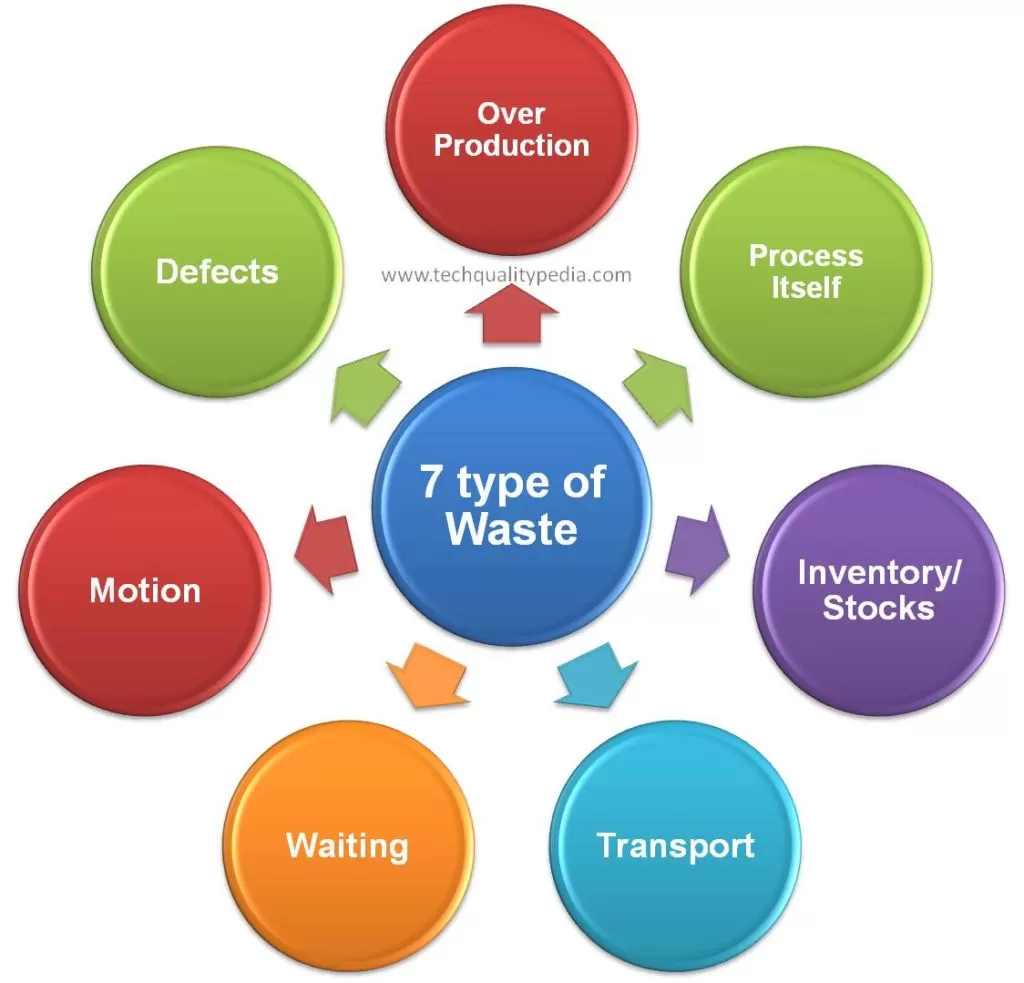Muda stands for eliminating waste or non-value-added activities from the manufacturing process. 7 waste of Lean Manufacturing come underMuda.
Toyota Production system-TPS look at three major waste and identify them as 3M Waste-Muda, Mura, and Muri. Muda means Waste, MURA means Inconsistency/Unevenness/Imbalance, and MURI means Strain/Overburden/Fatigue
It can be anything that does not add value from the customer’s point of view. There are seven types of Muda or 7 types of waste identified in the manufacturing process.
Seven types of Muda or 7 types of Waste are:
- MUDA ofOverproduction
- MUDA ofProcess Itself/Over Processing
- MUDA ofInventory/Stocks
- MUDA ofTransport
- MUDA ofWaiting
- MUDA ofMotion
- MUDA ofDefects

Table of Contents
MUDA of Overproduction:
Meaning: Production of goods more than a requirement or more than customer demand.
How to reduce waste? – Single piece flow at a time, Quick Tooling changeover, Production as per Market or Customer demand.
MUDA of Process Itself/Over Processing
Meaning:
>Doing unnecessary work within the operation itself and the customer is not willing to pay for it.
>Performing a process with more number of operations and High cycle time.
Example: Burr removal activity after drilling operation. Here burr removal is the unnecessary/over-processing work that is considered as part of the process.
How to reduce waste? – Use Low-Cost Automation Systems-LCA, Improvement in tools/jig/fixture, Value Engineering, Follow ECRS system i.e. “Eliminate, Combine, Rearrange and Simplify” the operations.
MUDA of Inventory/Stocks
Meaning: Accumulation of overstocks at Raw Material, Work in Process-WIP, Finished goods, and Warehouse. It is a result of overproduction, over procurement, and poor planning and hides the other types of Muda. Muda of stock will add the cost of storage and upkeep, scrap due to method change, searching and high Inventory, etc.
How to reduce waste? – Practice SMED- quick changeover, Balanced production as per customer demand, Better inventory management and control, Just in time – JIT approach, Define min. and max. levels, Material procurement as per schedule.
MUDA of Transport
Meaning: The movement of products from one area to another.
How to reduce waste? – Proper 5S, Line balancing and Equalized production, Product layout-U shape, Use conveyors, Practice Integrated Flow Manufacturing system.
MUDA of Waiting
Meaning: Idle condition of worker or machine.
Examples: Worker waiting for machine repair after a breakdown, Waiting for Material/Tools/Spares/Bins/Pallet/Jig/Fixtures, Operator waiting during Die crack/damage or die problem, Waiting for Die setup and Job setup approval, Watching for machine run, etc.
How to reduce waste? – Line balancing and Equalized production, Layout by product -U shape, Use Setup trolley while doing changeover, Provide all required tools/Jig and fixture online/near workplace.
MUDA of Motion
Meaning: The unnecessary movement of a worker between or within the operations.
Examples: Unnecessary move, pick and place and walking during operation.
How to reduce waste? –Operation must be within reach of the operator, U shape layout, Operator education, and training, Adhere standard operating system-SOPs, Better Ergonomics design on workplace-Minimum arms movement, Head movement, and Body movement.
MUDA of Defects
Meaning: Production of inferior goods i.e. Production of Rejected and Rework items.
Examples: Repeated Customer complaints in a company due to the poor condition of Dies/Jig & Fixture.
How to reduce waste? –Full proof/Poka-Yoke system to detect and avoid defect generation, Effective implementation of 7QC Tools, Adhere to Standard operating system-SOPs, Training & Education, Use of the good condition of Machines/Tools/ Dies/ Jigs & Fixtures.
In addition, Talent also added to create 8 Waste of Lean. This is the failure of an organization to use the competencies and skills of employees.
